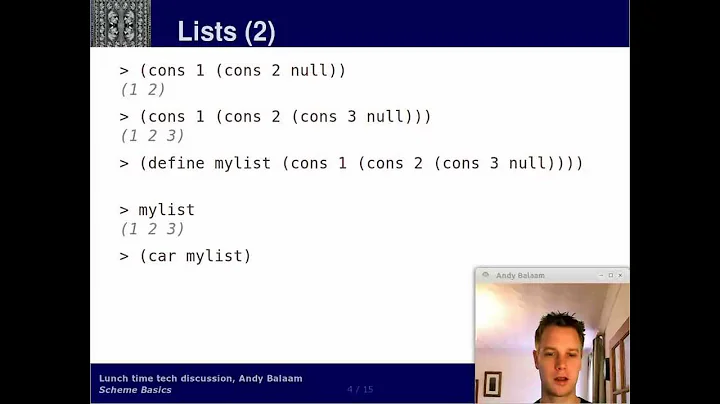Adding an element to List in Scheme
Solution 1
Well, there is append! as a primitive, which solves most of your problems, as noted already, Scheme tends to frown on mutation, it is possible, but typically avoided, so all procedures that mutate have a ! (called a bang) at their end.
Also, set! does not mutate data, it changes an environment, it makes a variable point to another thing, the original data is left unchanged.
Mutating data in Scheme is quite cumbersome, but, to give you my own implementation of append! to see how it is done:
(define (append! lst . lsts)
(if (not (null? lsts))
(if (null? (cdr lst))
(begin
(set-cdr! lst (car lsts))
(apply append! (car lsts) (cdr lsts)))
(apply append! (cdr lst) lsts))))
Note the use of set-cdr!, which is a true mutator, it only works on pairs, it mutates data in memory, unlike `set!'. If a pair is passed to a function and mutated with set-cdr! or set-car!, it is mutated every-where in the program.
This obeys the SRFI append! spec which says that it should be variadic and that it should return an undefined value, for instance.
(define l1 (list 1 2 3 4))
(define l2 (list 2 3 4))
(define l3 (list 3 1))
(append! l1 l2 l3)
l1
l2
l3
Which displays:
(1 2 3 4 2 3 4 3 1)
(2 3 4 3 1)
(3 1)
As visible, append! can take an infinite number of arguments and it mutates them all but the last.
Scheme might not be the ideal language for you though. The use of append! as said before is nonstandard, instead, append is preferred, which does not mutate and is called for its return value. Which I implement as such:
(define (append . lsts)
(cond
((null? lsts) '())
((null? (car lsts)) (apply append (cdr lsts)))
(else (cons (caar lsts) (apply append (cdar lsts) (cdr lsts))))))
> (append (list 1 2 3) (list 4 5 6) (list 'granny 'porn))
(1 2 3 4 5 6 granny porn)
Which shows a more familiar Scheme style in the absence of mutation, heavy use of recursion and no use of sequencing.
Edit: If you just want to add some elements to a list and not per se join two though:
(define (extend l . xs)
(if (null? l)
xs
(cons (car l) (apply extend (cdr l) xs))))
(define (extend! l . xs)
(if (null? (cdr l))
(set-cdr! l xs)
(apply extend! (cdr l) xs)))
(extend '(0 1 2 3) 4 5 6)
(define list1 '(0 1 2 3))
(extend! list1 4 5 6)
list1
Which does what you expect
Solution 2
-
appendcreates a new list, it does not modify an existing one. - This is because in general, Scheme (and Racket in this case) is a language that prefers functional style.
- You could get somewhat closer with a
set!-- but even that will disappoint you since it will modify only the local binding. - Note that in Racket in particular, lists are immutable, so there's nothing that can change a list.
- Furthermore, even if you could modify a list this way, it's a very inefficient way to accumulate long lists, since you have to repeatedly scan the whole list.
- Finally, if you have issues at this level, then I strongly recommend going over HtDP
Solution 3
(append foo bar) returns the concatenation of foo and bar. It doesn't change either foo or bar.
Related videos on Youtube
name_masked
Primary programming languages: Java, C Inclined on learning: Python, Android app Development
Updated on February 13, 2020Comments
-
name_masked about 4 years
Below is my code which takes a car element of a list
(carVal)and an list(initialized to empty) as parameters. I want to append the element to the list but the same is not working.(define populateValues (lambda (carVal currVal) (append currVal(list carVal )) (display currVal)))The display shows empty list all the time
(). Can anyone help me understand why? -
name_masked almost 14 yearsI need to come up with this functionality. What would you suggest in this case?
-
Eli Barzilay almost 14 yearsYou can use a
box, which is a kind of a pointer to a (mutable) value. BUT I doubt that you really need this functionality -- newbies often think they must have that because they're used to mutation being the only way to do things. -
Eli Barzilay almost 14 yearsNote that this will change
currValinside the function, but will have no visible effect outside. -
name_masked almost 14 yearsThanks for the answer .. Btw ..
granny,porn.. You might wanna change them .. Else you might get down voted :) -
Zorf almost 14 years@darkie15 It doesn't make the answer less 'useful' or 'clear', if people want to downvote it because of those things, then this site is already lost. Besides, you've got your answer anyway. =) Besides, other people can edit it out if they want to.





